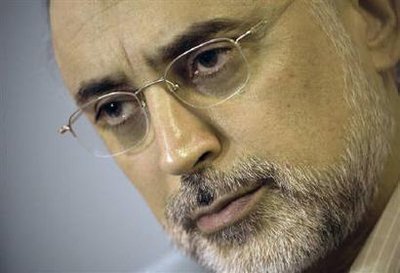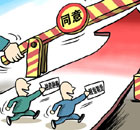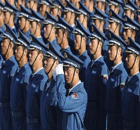Global General
Iran says nuclear fuel deal still possible
(Agencies)
Updated: 2010-02-11 02:49
 |
Large Medium Small |
TEHRAN:Iran believes a nuclear fuel exchange with the West is still possible, state television said on Wednesday, a day after the Islamic Republic's escalation of uranium enrichment drew a U.S. warning of more sanctions soon.
|
 Reuters and other foreign media are subject to Iranian restrictions on their ability to film or take pictures in Tehran. Ali Akbar Salehi, head of Iran's Atomic Energy Organisation, looks on while attending a news conference in Tehran September 29, 2009. [Photo/Agencies] |
"The deal is still on the table," Ali Akbar Salehi, head of Iran's Atomic Energy Organisation, said on English-language Press TV.
But he reiterated Iran's demand for a simultaneous fuel swap on its soil -- a likely non-starter for Western powers who want Tehran to send most of its low-enriched uranium abroad before it gets higher-grade fuel for a medical research reactor in return.
Salehi said Iran's uranium could be sealed and under the "custody" of the U.N.'s International Atomic Energy Agency (IAEA) in the country, until it receives reactor fuel.
Iran decided to step up enrichment after a failure to agree terms for the exchange, under which it would have sent the bulk of its low-enriched uranium abroad in return for 20-percent-pure fuel rods for a Tehran reactor producing medical isotopes.
Iran on Wednesday rejected a U.S. offer to supply it with medical isotopes if it stopped further enrichment of uranium, state television reported.
U.S. officials said this week Washington was prepared to help Iran obtain medical isotopes from third-country sources.
For world powers and the U.N. nuclear watchdog, the swap's attraction lies in preventing Iran from retaining enough of the material for a nuclear weapon, if it were refined to 90 percent.
Iran has until now limited its enrichment to 3.5 percent, but refining to low levels is the most technically challenging and time consuming stage of the process. Scaling the enrichment ladder above 20 percent can be done in months.
A confidential memo from IAEA chief Yukiya Amano obtained by Reuters said inspectors were seeking clarifications including technical details from Iran on its higher-grade nuclear work.
U.S. President Barack Obama said on Tuesday the international community was moving "fairly quickly" toward imposing broader sanctions on Iran.
Obama said Iran's refusal to accept a U.N.-brokered atomic fuel swap agreement suggested it was intent on trying to build nuclear weapons, despite its insistence its atomic activities were only for the generation of electricity.
Russian Deputy Foreign Minister Sergei Ryabkov told Itar-Tass news agency the drawing up of further sanctions had become more "relevant" because of Iran's swing towards higher-grade enrichment.
But he also said sanctions were not a panacea and complained that Western powers were leaning on Moscow to support them.
MEDICAL CARE
Salehi said Iran would stop producing 20 percent enriched uranium if it received reactor fuel from abroad instead.
But he made clear Tehran was not backing down on its demand for a simultaneous exchange, a condition unlikely to be accepted by the major powers involved in efforts to find a diplomatic solution to the long-running dispute.
"The uranium can be under the custody of the agency (IAEA) in Iran and it could be sealed ... until the time we receive the 20 percent enriched fuel from outside," Salehi said.
"If they come forward and supply the fuel then we will stop this process of 20 percent enrichment," he added.
Press TV quoted Salehi as saying Iran had decided to produce higher-grade uranium because Western nations refused to supply the fuel Iran needs for its medical reactor.
It said the reactor produces isotopes "crucial for life saving medical care to more than 850,000 Iranian patients."
Glyn Davis, U.S. envoy to the IAEA, said Iran continued to portray its move as "humanitarian" but instead it was putting lives at risk because, unlike foreign suppliers, Iran would not be able to replenish the reactor fuel's stock before it ran out.
Possible targets for any new sanctions include Iran's central bank, the Revolutionary Guards, who Western powers say are key to Iran's nuclear programme, shipping firms and its energy sector, Western diplomats say.










